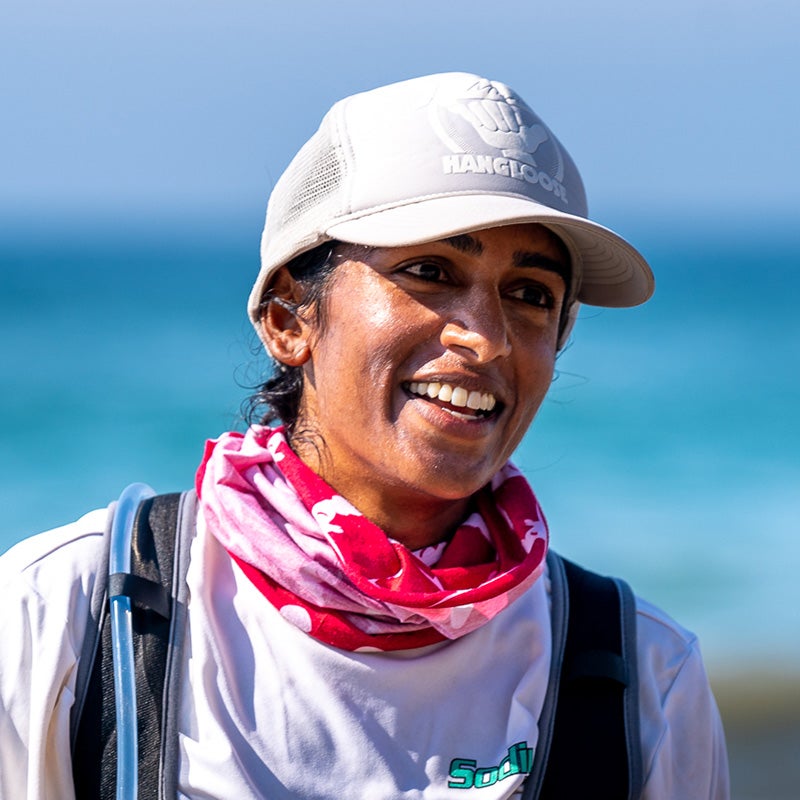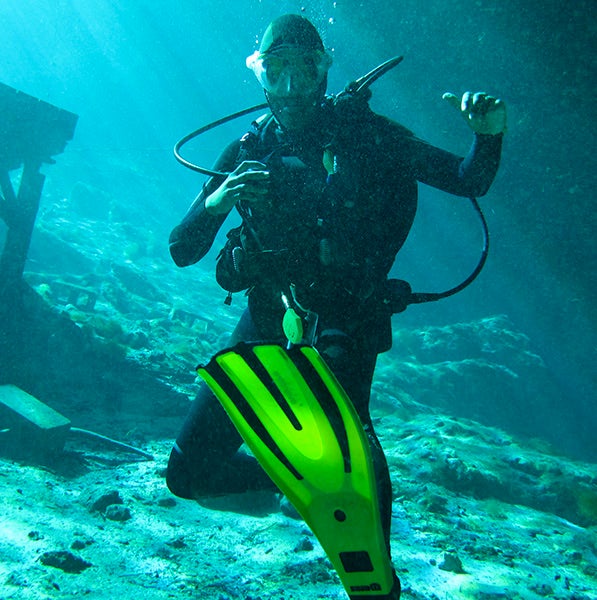
Blue MBA Graduate Anupa Asokan brings a unique perspective and pragmatic approach to marine conservation.
By Janine Weisman
There was little time to put names to faces before the 24 teenagers chaperoned by Anupa Asokan boarded their flight in Los Angeles. Not that she could see the faces of her young charges anyway. After all, this was a pandemic.
“They all had masks on,” Asokan said, laughing as she recalled the educational trip she led last July. “I was just hoping that all the right kids were on the plane.”
Ever an optimist, Asokan and all her student travelers made it safely to their destination in Baja, Mexico. There they met up with Asokan’s two co-leaders for 11 days of exploring the warm waters of the Gulf of California and working with scientists and marine conservationists to collect data on undersea species that could help preserve at-risk marine habitats.
Her positive outlook partly explains why this Southern California-based environmental consultant and itinerant educator joined the call to support the 30×30 Campaign. That’s the name for a growing global push to get world leaders to commit to protecting at least 30% of the planet by 2030 to restore biodiversity, curb climate change and increase access to natural spaces. A key component of the 30×30 Campaign is increasing the number of Marine Protected Areas (MPAs), places like Cabo Pulmo National Marine Park where Asokan introduced her two dozen students to the only living coral reef in the Gulf of California.
Cabo Pulmo became a park in 1995 after overfishing left the area largely depleted of marine life. But reef fish have made a dramatic recovery in the decades since then, making Cabo Pulmo a popular diving tourism destination. While fishing is off limits in the park, some believe it has improved fishing in surrounding waters.
“It’s an inspiring example of what we can accomplish with 30×30 at local scales,” Asokan said of Cabo Pulmo. “For students, it’s an amazing example of what effective conservation should look like—the key being community involvement and guidance, further informed by science.”
With one United Nations report suggesting human activity will drive one million species to extinction within a few decades, the 30×30 campaign can’t be just an aspirational goal. Saving the planet is going to take pragmatism, and Asokan has it in spades. She has embraced the 30×30 Campaign with a unique blend of skills as a 2012 graduate of the University of Rhode Island’s Blue MBA Program.
A focus on the ocean and the business world
Graduates of this dual-degree program offered jointly by the Graduate School of Oceanography and College of Business earn both an MBA and a Master of Oceanography in what is the first program of its kind in the U.S. Asokan was drawn to the versatility of URI’s Blue MBA while contemplating a career move. She spent three years teaching marine science at the Catalina Island Marine Institute, her first job after earning her undergraduate earth sciences degree from UCLA.
“I knew I wanted to stick to the ocean,” she recalled. “In my mind at the time, having the MBA was a fallback. Since then, I’ve realized how much that business degree helps.”
Blue MBA graduates often go on to careers in energy, ocean technology and engineering, fisheries, marine navigation and tourism, and corporate environmental sustainability, but Asokan keeps charting her own path. She is a member of the national Board of Directors for the Surfrider Foundation, the grassroots organization of coastal recreation users. In October 2020, she completed a 27-mile standup paddleboard trek across Santa Monica Bay to raise over $10,000 for Surfrider. Asokan turned the fundraiser into a teachable moment as her social media followers observed her encounters with marine life. She was planning another standup paddleboarding fundraiser along the Los Angeles County coastline for October 2021.
“I think of Anupa as somebody who inspires confidence,” said Zoe Ruge, a close friend who earned a Master of Science degree in oceanography from URI in 2013. “She’s a great ambassador for the ocean, and she always has been.”
Asokan sharpened her scientific communication skills while living with four other housemates strictly focused on science. Ruge, now a physical scientist at the U.S. Environmental Protection Agency’s D.C. headquarters, recalled Asokan had a knack for getting her fellow grad students to talk about their work in a way that could be understood by non-scientists.
“For scientists, we do get caught up in jargon and data a lot of the time, so to talk with her was a really great exercise for us,” Ruge said. “She’s always been really great at being able to communicate things in a way that distills it down to what it is.”
One of several grad students in her Blue MBA cohort, Asokan made a lasting impression on GSO Professor and Associate Dean David C. Smith. “Anupa was kind of like the glue that held the group together as far as I could tell,” Smith said.
Whether she’s diving in the Pacific, advocating in Washington D.C., fishing off the Florida coast, or promoting causes for the surfing community, Asokan lives in, on, and for the ocean.
Coaching scientists to communicate clearly
Asokan first became active with Surfrider when she moved to Washington, D.C. in 2013 and served as chapter chair. She worked for a nonprofit for two years before moving to a communications role for the research and development arm of the National Oceanic and Atmospheric Administration. At NOAA, Asokan wrote reports that went to White House officials, provided media training for scientists and wrote speeches for the chief research scientist. She also managed special events that helped share NOAA’s latest cutting-edge research with the public and government officials.
In 2018, Asokan returned to Los Angeles and took a job in fundraising managing the Ocean Initiative and leading government affairs with the nonprofit XPRIZE Foundation. Furloughed during the pandemic, she not only had more time for standup paddleboarding but ocean advocacy as well. She wrote a well-received op-ed for the nonprofit news website Cal Matters lamenting the California Legislature’s failure to pass a conservation bill to protect at least 30% of the state’s land areas and waters. That bill had garnered a great deal of opposition from the fishing industry.
“I realized I had a unique perspective because most of the pushback when we’re looking at the ocean is coming from ocean fishing interest groups,” said Asokan, who grew up in Florida.
“I love to fish. It’s the first thing that connected me to the ocean and I don’t look like all of the guys who are so opposed to (marine protections) and I share a different perspective.”
Conservationists believe MPAs allow marine life to recover, restore biodiversity and help address climate change. But the overwhelmingly white and male fishing industry has argued MPAs are difficult to monitor and enforce, are often politicized and hurt those who depend on fisheries for their livelihood.
“We let the fishermen make Marine Protected Areas about fishing and not fishing when in this case, it’s about something different,” Asokan said. “We’re trying to protect habitat. We’re trying to prompt climate resilience and address biodiversity issues. What I think is also important is that all of the 30×30 laws in the U.S. and in California, a state that’s pushed it forward, have really inclusive language about access.”
“Look at New England,” Asokan said. “Historically, you have all these private beaches and beach clubs that, as an outsider, you can’t get close to the coast. You get discounted parking on the Cape if you own a home there, but you have to have a certain level of privilege to be able to afford a home.”
What access really means has been on Asokan’s mind a lot lately. There’s more to come from this business savvy marine scientist who believes the future holds better outcomes for the planet.
Stay tuned.
“I have another op-ed in the works,” she said.





